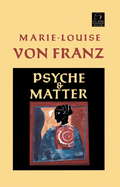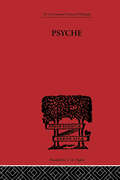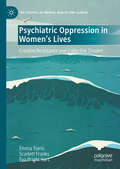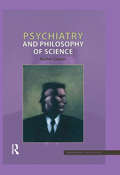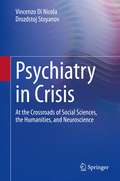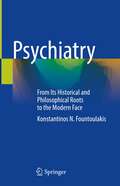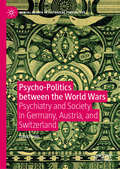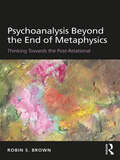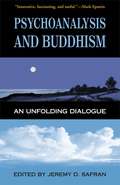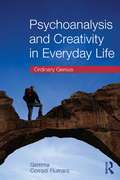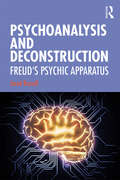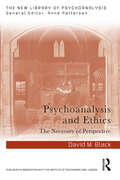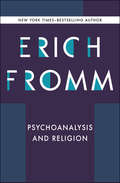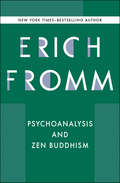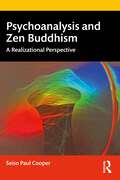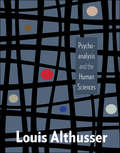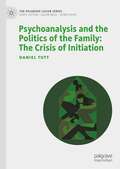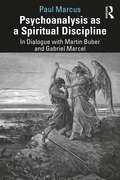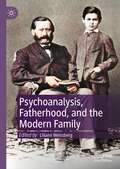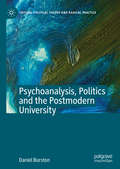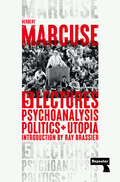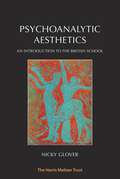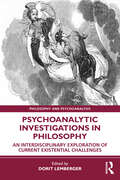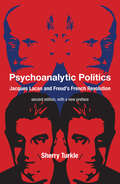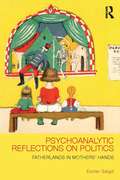- Table View
- List View
Psyche and Matter
by Marie-Louise von FranzTwelve essays by the distinguished analyst Marie-Louise von Franz--five of them appearing in English for the first time--discuss synchronicity, number and time, and contemporary areas of rapprochement between the natural sciences and analytical psychology with regard to the relationship between mind and matter. This last question is among the most crucial today for fields as varied as microphysics, psychosomatic medicine, biology, quantum physics, and depth psychology.
Psyche: The cult of Souls and the Belief in Immortality among the Greeks (International Library of Philosophy)
by Erwin RohdeFirst published in 2000. Routledge is an imprint of Taylor & Francis, an informa company.
Psychiatric Oppression in Women's Lives: Creative Resistance and Collective Dissent (The Politics of Mental Health and Illness)
by Emma Tseris Scarlett Franks Eva Bright HartThis book provides a comprehensive analysis of women's experiences within mental health services, demonstrating the need for a radical paradigm shift in how women's distress and experiences are understood. Drawing on extensive fieldwork on coercive mental health treatment, including interviews, participatory action research, arts-based research, and public sociology, the book centres the knowledge, skills, and creativity of psychiatrised women. Informed by intersectional feminism and critical mental health theory, the book explores the interlocking oppressions of psychiatric harm and patriarchal power, alongside women's survivorship and resistances. Areas covered include the pathologisation of women's emotions within mental health services, violence and deprivations in involuntary treatment, the surveillance of mothering, and social exclusions arising from psychiatric diagnoses. The book highlights the ability of collective and creative research processes to move beyond the task of documenting psychiatric harm, towards imagining rich alternatives to biomedical, therapeutic, and carceral practices in mental health. It offers a critique of the notions of ‘benevolence’ and ‘expertise’, which are commonly used to justify psychiatric coercion. It will appeal to students and scholars working across the fields of critical mental health, sociology, social work, psychiatry, mental health nursing and gender studies. Emma Tseris is senior lecturer in Social Work and Policy Studies at the University of Sydney, Australia, researching feminist and critical mental health theory. She is the author of Trauma, Women's Mental Health and Social Justice: Pitfalls and Possibilities (2019) and co-author of Using Social Research for Social Justice (2023). Scarlett Franks is a survivor researcher from the University of Sydney, Australia, who also serves on the Survivor College of the National Centre for Action on Child Sexual Abuse, the board of directors of the Grace Tame Foundation, and the Advisory Panel of the NSW Office of the Anti-Slavery Commissioner. Eva Bright Hart is a feminist survivor researcher from the University of Sydney, Australia. She is a senior social worker and public health professional from a rural area. Eva is also known as a mother, teacher, gardener, cook, author, activist and artist. As a survivor of psychiatric and gendered violence Eva uses a protective pseudonym so she can contribute without the fear of further discrimination, disablement and involuntary psychiatric treatment for herself and her family. Eva means "living one".
Psychiatry and Philosophy of Science (Philosophy And Science Ser. #3)
by Rachel Cooper"Psychiatry and Philosophy of Science" explores conceptual issues in psychiatry from the perspective of analytic philosophy of science. Through an examination of those features of psychiatry that distinguish it from other sciences - for example, its contested subject matter, its particular modes of explanation, its multiple different theoretical frameworks, and its research links with big business - Rachel Cooper explores some of the many conceptual, metaphysical and epistemological issues that arise in psychiatry. She shows how these pose interesting challenges for the philosopher of science while also showing how ideas from the philosophy of science can help to solve conceptual problems within psychiatry. Cooper's discussion ranges over such topics as the nature of mental illnesses, the treatment decisions and diagnostic categories of psychiatry, the case-history as a form of explanation, how psychiatry might be value-laden, the claim that psychiatry is a multi-paradigm science, the distortion of psychiatric research by pharmaceutical industries, as well as engaging with the fundamental question whether the mind is reducible to something at the physical level. "Psychiatry and Philosophy of Science" demonstrates that cross-disciplinary contact between philosophy of science and psychiatry can be immensely productive for both subjects and it will be required reading for mental health professionals and philosophers alike.
Psychiatry in Crisis: At the Crossroads of Social Sciences, the Humanities, and Neuroscience
by Vincenzo Di Nicola Drozdstoj StoyanovThe field of academic psychiatry is in crisis, everywhere. It is not merely a health crisis of resource scarcity or distribution, competing claims and practice models, or level of development from one country to another, but a deeper, more fundamental crisis about the very definition and the theoretical basis of psychiatry. The kinds of questions that represent this crisis include whether psychiatry is a social science (like psychology or anthropology), whether it is better understood as part of the humanities (like philosophy, history, and literature), or if the future of psychiatry is best assured as a branch of medicine (based on genetics and neuroscience)? In fact, the question often debated since the beginning of modern psychiatry concerns the biomedical model so that part of psychiatry’s perpetual self-questioning is to what extent it is or is not a branch of medicine. This unique and bold volume offers a representative and critical survey of the history of modern psychiatry with deeply informed transdisciplinary readings of the literature and practices of the field by two professors of psychiatry who are active in practice and engaged in research and have dual training in scientific psychiatry and philosophy. In alternating chapters presenting contrasting arguments for the future of psychiatry, the two authors conclude with a dialogue between them to flesh out the theoretical, research, and practical implications of psychiatry’s current crisis, outlining areas of divergence, consensus, and fruitful collaborations to revision psychiatry today. The volume is scrupulously documented but written in accessible language with capsule summaries of key areas of theory, research, and practice for the student and practitioner alike in the social and human sciences and in medicine, psychiatry, and the neurosciences.
Psychiatry: From Its Historical and Philosophical Roots to the Modern Face
by Konstantinos N. FountoulakisThis book was the end product of life experiences, thoughts and intellectual wanderings of the author, who through his career and for the last twenty years was always serving all the three aspects of a Psychiatrist: He is a clinician, a researcher and an academic teacher. The book includes a comprehensive history of Psychiatry since antiquity and until today, with an emphasis not only on main events but also specifically and with much detail and explanations, on the chain of events that led to a particular development. At the center of this work is the question ‘What is mental illness?’ and ‘Does free will exist?’. These are questions which tantalize Psychiatrists, neuroscientists, psychologists, philosophers, patients and their families and the sensitive and educated lay persons alike. Thus, the book includes a comprehensive review and systematic elaboration on the definition and the concept of mental illness, a detailed discussion on the issue of free will as well as the state of the art of contemporary Psychiatry and the socio-political currents it has provoked.Finally the book includes a description of the academic, social and professional status of Psychiatry and Psychiatrists and a view of future needs and possible developments. A last moment addition was the chapter on conspiracy theories, as a consequence of the experience with the social media and the public response to the COVID-19 outbreak which coincided with the final stage of the preparation of the book. Their study is an excellent opportunity to dig deep into the relation among human psychology, mental health, the society and politics and to swim in intellectually dangerous waters.
Psycho-Politics between the World Wars: Psychiatry and Society in Germany, Austria, and Switzerland (Mental Health in Historical Perspective)
by David FreisThis book is about the psycho-political visions and programmes in early-twentieth century Germany, Austria, and Switzerland. Amidst the political and social unrest that followed the First World War, psychiatrists attempted to use their clinical insights to understand, diagnose, and treat society at large. The book uses a variety of published and unpublished sources to retrace major debates, protagonists, and networks involved in the redrawing of the boundaries of psychiatry’s sphere of authority. The book is based on three interconnected case studies: the overt pathologisation of the 1918/19 revolution led by right-wing German psychiatrists; the project of medical expansionism under the label of ‘applied psychiatry’ in inter-war Vienna; and the attempt to unite and implement different approaches to psychiatric prophylaxis in the movement for mental hygiene. By exploring these histories, the book also sheds light on the emergence of ideas that still shape the field to the present day and shows the close connection between utopian promises and the worst abuses of psychiatry.
Psychoanalysis Beyond the End of Metaphysics: Thinking Towards the Post-Relational
by Robin S. BrownWinner of the Theoretical Category of the American Board & Academy of Psychoanalysis Book Prize for best books published in 2016 Psychoanalysis Beyond the End of Metaphysics offers a new paradigm approach which advocates reengaging the importance of metaphysics in psychoanalytic theorizing. The emergence of the relational trend has witnessed a revitalizing influx of new ideas, reflecting a fundamental commitment to the principle of dialogue. However, the transition towards a more pluralistic discourse remains a work in progress, and those schools of thought not directly associated with the relational shift continue to play only a marginal role. In this book, Robin S. Brown argues that for contemporary psychoanalysis to more adequately reflect a clinical ethos of pluralism, the field must examine the extent to which a theoretical commitment to the notion of relationship can grow restrictive. Suggesting that in the very effort to negotiate theoretical biases, psychoanalytic practice may occlude a more adequate recognition of its own evolving assumptions, Brown proposes that the profession’s advance requires a return to first principles. Arguing for the fundamental role played by faith in supporting the emergence of consciousness, this work situates itself at the crossroads of relational, Jungian, and transpersonal approaches to the psyche. Psychoanalysis Beyond the End of Metaphysics will be of significant interest to all psychodynamically oriented clinicians, alongside scholars of depth psychology and the philosophy of mind. It will also be helpful to advanced and postgraduate students of psychoanalysis seeking to orient themselves in the field at present.
Psychoanalysis and Buddhism
by Jeremy D. Safran"What a wonderful book! Jeremy Safran has assembled an absolutely stellar group of writers and has himself contributed an illuminating introduction. The essays are riveting and the book is the rare edited collection with real thematic unity. If you think you might have an interest in the intersection of psychoanalysis and Buddhism, this is the place to start. If you already know you're interested, once you look at the table of contents you'll find (at least I did) that you want to let Psychoanalysis and Buddhism displace whatever you were going to read next."--Donnel B. Stern, PhD, author of Unformulated Experience and editor of Contemporary Psychoanalysis
Psychoanalysis and Creativity in Everyday Life: Ordinary Genius
by Gemma Corradi FiumaraPsychoanalysis and Creativity in Everyday Life: Ordinary Genius is an attempt to create a psychoanalytic space for the quest and questions of our everyday creativity. Official creativity is normally applauded to the point of obscuring all other types of creativity, with detrimental consequences for our psychic life. However, as Gemma Corradi Fiumara demonstrates, the creative force of ordinary subjects can be as vigorous as that of our acclaimed, official accomplishments. Corradi Fiumara focuses on the unsung creativity which emerges from relationships and the world at large. She explores how understanding the operation of creative impulses in an everyday setting can crucially inform psychoanalytic clinical work. There are three main themes: Donald Winnicott’s Psychoanalytic Will Melanie Klein and the Other Side of Genius Genius: Ordinary and Extraordinary. Psychoanalysis and Creativity in Everyday Life advocates an inclusionary view of human genius, and demonstrates that creativity and genius can be manifested in everyday life with the ordinary as its focus of attention. It will be key reading for psychoanalysts, psychoanalytic psychotherapists, philosophers and scholars in social studies.
Psychoanalysis and Deconstruction: Freud's Psychic Apparatus
by Jared RussellPsychoanalysis and Deconstruction: Freud's Psychic Apparatus demonstrates the relevance of deconstructive thinking for the clinical practice of psychoanalysis. Arguing that deconstruction has been misrepresented as a form of literary theory or a philosophy of language, the book puts Derrida, Heidegger and others working in the tradition of deconstruction into dialogue with debates in the contemporary psychoanalytic field. Attempting to retrieve what was radical in Freud’s portrayal of the mind as a machine, Jared Russell stresses the importance of psychoanalysis for an understanding of the relationship between the human and its current hyper-technological environment. Interventions into contemporary debates address psychoanalytic concepts such as the nature of the clinical frame, the intersubjective dialogue, unconscious communication and the experience of time. Russell argues that deconstruction, and in particular Derrida’s work, can anticipate and help clarify ongoing developments at the cutting edge of psychoanalysis today. Psychoanalysis and Deconstruction: Freud's Psychic Apparatus will appeal not only to a philosophically informed audience but also to clinicians attempting to secure a place for psychoanalytic practice at the beginning of the twenty-first century.
Psychoanalysis and Ethics: The Necessity of Perspective (New Library of Psychoanalysis)
by David M. BlackPsychoanalysis and Ethics: The Necessity of Perspective is an attempt to look deeply into the relationship between psychoanalysis and ethics, and in particular into the failure of traditional psychoanalytic thinking to recognise the foundational character of ethical values. In recent years, partly because of the climate crisis, the need for an "ethical turn" in our thinking has been recognised with increasing urgency. Using different historical lenses, and with special reference to the thought of the philosopher Emmanuel Levinas and pioneering American psychoanalysts such as Hans Loewald and Stephen Mitchell, the author discusses the perspectives needed in addition to those of science if the facts of "psychic reality" are to be more adequately recognised. In particular, this book emphasises the importance of a coherent account of the role of ethics in shaping the development both of the individual and of society. Psychoanalysis and Ethics is essential reading for those concerned for the importance of ethics in psychoanalytic practice and theory, and more widely for those seeking to understand the place of ethics and religion in psychological development.
Psychoanalysis and Religion (The\terry Lectures Ser.)
by Erich FrommAn exploration of what religion and spirituality mean to us as humans, by the New York Times–bestselling author and social psychologist. In 1950, Erich Fromm attempted to free religion from its social function and to develop a new understanding of religious phenomena. Rather than analyzing what people believe in—whether they&’re monotheistic, polytheistic, or atheistic—Fromm presents an idea of what religion means in secular terms. In his timeless and straightforward style, Fromm unmasks the alienating effects of any authoritarian religion. He reveals how a humanistic religion is conducive to one&’s own humanity, and explains why psychoanalysis does not threaten religion. Whether you&’re a believer or a long-time atheist, Fromm&’s erudite analysis of religion is sure to reshape your concept of spirituality. This ebook features an illustrated biography of Erich Fromm including rare images and never-before-seen documents from the author&’s estate.
Psychoanalysis and Zen Buddhism (Condor Bks.)
by Erich FrommThe renowned psychoanalyst and New York Times–bestselling author of The Art of Loving unites philosophy from the East and West. In 1957, social philosopher and psychoanalyst Erich Fromm invited Daisetz T. Suzuki, the most famous Zen Buddhist master in the Western world, to a seminar at his new home in Cuernavaca, Mexico. Their discussion was one of the highlights of Fromm&’s life, and the paper Fromm presented (and later expanded into a book) was a watershed work. Fromm demonstrates his mastery of the philosophy and practice of Zen, perfectly articulating how Zen tenets fit into the ideas of psychoanalysis. In this text, he creates new perspectives on both systems of thought. This ebook features an illustrated biography of Erich Fromm including rare images and never-before-seen documents from the author&’s estate.
Psychoanalysis and Zen Buddhism: A Realizational Perspective
by Seiso Paul CooperIn this book, Cooper brings together psychoanalysis and Zen Buddhism by offering a comprehensive and integrated model, described as "The Realizational Model", that is consistent with the core concepts of Soto Zen Buddhism and psychoanalytic practice. Focusing primarily on Soto Zen Buddhism as presented in the original writings of the Japanese scholar monk Eihei Dōgen (1200-1253), and supported and elaborated by relevant contemporary scholarship in relation to the writings of the British psychoanalyst, Wilfred Bion (1897-1979), this book addresses the issue of how can one understand, assimilate, and integrate conceptions of the human mind that originate in the 13th and 20th centuries, as they are visited and inflected by the unconscious preconceptions of a 21st-century perspective. Expressing authentic Buddhist tradition within the frame of psychoanalytic thinking, and supported by online guided audio meditations that accompany the text, this work offers a uniquely interdisciplinary perspective of invaluable clinical significance. Case material garnered from 35 years of psychoanalytic practice as well as examples from daily life support the abstract concepts discussed in the text, rendering it equally relevant for psychoanalysts and psychotherapists, as well as students of Zen wishing to explore its practical applications.
Psychoanalysis and the Human Sciences (European Perspectives: A Series in Social Thought and Cultural Criticism)
by Louis AlthusserWhat can psychoanalysis, a psychological approach developed more than a century ago, offer us in an age of rapidly evolving, hard-to-categorize ideas of sexuality and the self? Should we abandon Freud's theories completely or adapt them to new findings and the new relationships taking shape in modern liberal societies? In a remarkably prescient series of lectures delivered in the early 1960s, the French philosopher Louis Althusser anticipated the challenges that psychoanalytic theory would face as politics moved away from structuralist frameworks and toward the elastic possibilities of anthropological and sociological thought.Psychoanalysis and the Human Sciences translates Althusser's remarkable seminars into English for the first time, making available to a wider audience the origins and potential future of radical political theory. Althusser takes the important step in these lectures of distinguishing psychoanalysis from psychology and especially psychiatry, which long resisted Freud's analytical concepts of the unconscious and overdetermination. By freeing psychoanalysis from this bind, Althusser can then apply these analytical concepts to the social and the political, integrated with Marxist theory. The result is an enlivened methodology for comprehending social organization and change that had a profound influence on the Frankfurt School and scholars who continue to work at the forefront of radical thought today: Judith Butler, Étienne Balibar, and Alain Badiou.
Psychoanalysis and the Politics of the Family: The Crisis of Initiation (The Palgrave Lacan Series)
by Daniel TuttPsychoanalysis and the Politics of Family aims to raise a sophisticated and highly accessible debate around the family, self-making and the political and cultural implications of liberation. The text proposes a new way to read the Lacanian theory of Oedipus and through this reading resituate a series of important political and theoretical debates that have concerned intellectual life over the last forty years. It is written with an accessible style so that both specialists in Lacanian and Marxist theory and a broader cross-section of readers interested in understanding the implications of debates across populist and Marxist perspectives that have occupied the global left since the 2008 economic crash. The text aims to resituate the way theories of emancipation and liberation are theorized from a distinctive psychoanalytic and Lacanian point of view. In resituating the infamous “Oedipus complex” in a new light, the text re-opens a series of debates with important theoretical interlocutors, including the influential American historian and psychoanalytic thinker Christopher Lasch, whose thought has witnessed a significant renaissance of interest today, to the staunch critic of Freud and Lacan, René Girard, to Gilles Deleuze and Félix Guattari and their widely read Anti-Oedipus series that disputes the Freudian and Lacanian notions of Oedipus.
Psychoanalysis as a Spiritual Discipline: In Dialogue with Martin Buber and Gabriel Marcel
by Paul MarcusThe great existential psychiatrist Ludwig Binswanger famously pointed out to Freud that therapeutic failure could "only be understood as the result of something which could be called a deficiency of spirit." Binswanger was surprised when Freud agreed, asserting, "Yes, spirit is everything." However, spirit and the spiritual realm have largely been dropped from mainstream psychoanalytic theory and practice. This book seeks to help revitalize a culturally aging psychoanalysis that is in conceptual and clinical disarray in the marketplace of ideas and is viewed as a "theory in crisis" no longer regarded as the primary therapy for those who are suffering. The author argues that psychoanalysis and psychoanalytic psychotherapy can be reinvigorated as a discipline if it is animated by the powerfully evocative spiritual, moral, and ethical insights of two dialogical personalist religious philosophers—Martin Buber, a Jew, and Gabriel Marcel, a Catholic—who both initiated a "Copernican revolution" in human thought. In chapters that focus on love, work, faith, suffering, and clinical practice, Paul Marcus shows how the spiritual optic of Buber and Marcel can help revive and refresh psychoanalysis, and bring it back into the light by communicating its inherent vitality, power, and relevance to the mental health community and to those who seek psychoanalytic treatment.
Psychoanalysis, Fatherhood, and the Modern Family
by Liliane WeissbergTo what extent are the concepts of fatherhood and family, as proposed by Sigmund Freud, still valid?Psychoanalysis, Fatherhood, and the Modern Family traces the development of Freud’s theory of the Oedipus complex and discusses his ideas in the context of recent psychoanalytic work, new sociological data, and theoretical explorations on gender and diversity. Contributors include representatives from many academic disciplines, as well as practicing psychoanalysts who reflect on their experience with patients. Their exciting essays break new ground in defining who a father is—and what a father may be.
Psychoanalysis, Politics and the Postmodern University (Critical Political Theory and Radical Practice)
by Daniel BurstonCritical theory draws on Marxism, psychoanalysis, postmodern and poststructuralist theorists. Marxism and psychoanalysis are rooted in the Enlightenment project, while postmodernism and poststructuralism are more indebted to Nietzsche, whose philosophy is rooted in anti-Enlightenment ideas and ideals. Marxism and psychoanalysis contributed mightily to our understanding of fascism and authoritarianism, but were distorted and disfigured by authoritarian tendencies and practices in turn. This book, written for clinicians and social scientists, explores these overarching themes, focusing on the reception of Freud in America, the authoritarian personality and American politics, Lacan’s “return to Freud,” Jordan Peterson and the Crisis of the Liberal Arts, and the anti-psychiatry movement.
Psychoanalysis, Politics, and Utopia: Five Lectures
by Herbert MarcuseAn impassioned plea for overcoming capitalism, whose urgency is more timely today than when it was first published fifty years ago.Back in print after fifty years and with a new introduction by Ray Brassier, this often overlooked but prescient collection of Marcuse's lectures makes an impassioned plea for the overthrowing of capitalism.Analysing the work of Freud and Marx, and taking in topics like automation, work, postcapitalism, utopia, and technology, Psychoanalysis, Politics, and Utopia excavates the psychic roots of the current crisis of capitalist civilisation, and gives us a blueprint for the emancipation of humanity from the toils of capitalism.In a world reeling from the ongoing collapse of the neoliberal consensus, coupled with the accelerating pace of catastrophic climate change wrought by capitalism, Marcuse&’s radical insights in Psychoanalysis, Politics, and Utopia are as urgently relevant today as they were in 1970.
Psychoanalytic Aesthetics: An Introduction to the British School
by Nicky GloverThis is a book to which the attention of students of art theory and criticism, and all those interested in the important application of psychoanalysis to other fields of study, should be drawn. Psychoanalytic Aesthetics rethinks the classical account of the relation between art and madness, creativity and psychoneurosis, and the distinction between the primary and secondary processes. It covers a great deal of ground and reviews many psychoanalytic writers (predominantly of the British tradition) on aesthetics, as well as many of the aestheticians using a psychoanalytic background. It is well written and there is an impressive grasp of the many writers covered. More than this, the book is also a work of psychoanalytic scholarship, being a masterly overview of psychoanalytic schools of thought, and an in-depth study of the British object-relations schools. It amply achieves its overriding goal to demonstrate that the work of the British School presents a significant contribution to psychoanalytic aesthetics and criticism, updating Freud, Kris and the classical contributions to the field. It is therefore potentially a very useful source book for future scholars of both psychoanalysis and of aesthetics.
Psychoanalytic Investigations in Philosophy: An Interdisciplinary Exploration of Current Existential Challenges (Philosophy and Psychoanalysis)
by Dorit LembergerThis pioneering volume explores and exemplifies the relevance of psychoanalysis to contemporary philosophical problems. The novelty of the book's viewpoint is the consideration of psychoanalysis as an existentialist mode of thinking that deals with current existential problems such as loneliness, uncertainty, struggling with personal tragedies and rehabilitation. Each chapter presents classic aspects of psychoanalytic theory based on Greek tragedies, as well as their similarities with interdisciplinary aspects in other areas of study like modern literature, hermeneutics, and philosophy of language. To deepen each subject, each chapter also applies an interdisciplinary methodology that illuminate previously hidden insights arising from the fusion of psychoanalysis and philosophy. Featuring contributions from well-known scholars like Professor Avi Sagi and Professor Dov Schwartz, as well as more up-and-coming writers, the book suggests possible implications of philosophical, hermeneutical, and literary theories to the perception of post-modern issues concerning agency and the subjective emotional world. Psychoanalytic Investigations in Philosophy is of great interest to scholars of psychoanalysis and hermeneutic philosophy, as well as teachers and academics who want to explore new teaching methods in various disciplines, and general-interest readers who wish to expand their horizons around concepts that can be applied to better understand themselves and the age in which we live.
Psychoanalytic Politics, second edition, with a new preface: Jacques Lacan and Freud's French Revolution
by Sherry TurkleAn updated edition of the seminal book that explores why the interest in psychoanalysis in France exploded after 1968 and what it says about culture and therapy.Among Western countries, France may well be the one that resisted Freud the longest. But, in the late 1960s, France was seized by an infatuation with Freudianism. By the end of that decade, France had more than a psychoanalytic movement: it had a widespread and deeply rooted psychoanalytic culture. At the heart of this development was Jacques Lacan's reconstruction of Freudian theory, a reinvention of psychoanalysis that resonated with French culture in the aftermath of the uprisings of 1968. In Psychoanalytic Politics, the second edition of her groundbreaking work, Sherry Turkle tells the fascinating story of Lacan and why his work so profoundly influenced the French psyche. While in the United States psychoanalysis is identified with an essentially conservative medical establishment, the French rediscovery of Freud, in a dramatic enactment of Freud&’s prophesy, became associated with the most radical elements of French philosophical and political life. In this book, Turkle provides a firsthand account of the psychoanalytic culture that developed in France—as a politicized, Gallicized, and poeticized Freudianism, deeply marked by the work of Jacques Lacan. The clearest introduction in English to Lacan's teaching, Psychoanalytic Politics explores how cultures appropriate theories of mind and how ideas come to connect with individuals. The book&’s final chapter provides a fascinating portrayal of the last years of Lacan&’s life—the intrigue and power struggles that resulted in the break-up of the Freudian School he founded and the events that unfolded in the years following his death in 1981.This edition includes a new preface by the author, reflecting on the origins of the book and its relevance for today: a time when the integration of thought and feeling, politics and self-examination is as urgent an endeavor as ever.
Psychoanalytic Reflections on Politics: Fatherlands in mothers' hands
by Eszter SalgóPsychoanalytic Reflections on Politics: Fatherlands in mothers’ hands is a playful exploration of how people’s desires, fantasies, and emotions shape political events and social phenomena. It highlights the mythical sources of today’s political projects, the power of political imagination, and the function of symbolism in political thought. Eszter Salgó argues that the driving force for the formation of political communities is fantasy – ‘illusions’ in a Winnicottian sense, ‘phantasies’ in a Lacanian sense, ‘phantoms’ as described by Nicolas Abraham and Maria Torok, and ‘dreams’ as interpreted by Sándor Ferenczi. She introduces the metaphor of the ‘fantastic family’ as a symbolic representation of political communities, both to reflect on people’s deeply felt desire to find in public life the resolution, love, and wholeness of early childhood, and to unveil the political elite’s readiness to don the mask of the ‘ideal parent’. The book is divided into two parts. The first part of the book explores the theories of Donald Winnicott and Jacques Lacan: the matrimony on the stage of politics between the ‘good-enough mother’ and the Symbolic Father which inaugurates the story of democracy’s ‘fantastic family’. The second part presents the ‘fantastic families’ of selected countries such as Hungary, Italy, and the world community to explain the proliferation of cosmogony projects, and to document the failure of the political elites to offer a satisfactory performance of their maternal and paternal functions. Psychoanalytic Reflections on Politics: Fatherlands in mothers’ hands presents a new way of considering the art of politics, based on the understanding that people perceive reality through imagination and unconscious fantasy. It will be of interest to psychoanalysts, and academics from across the disciplines of politics, psychology, anthropology, sociology, philosophy, literature, and art.
